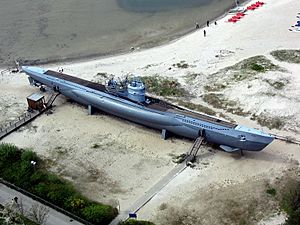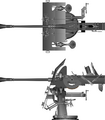German submarine U-1105 facts for kids

U-995, last remaining Type VIIC U-boat, sister to U-1105
|
|
Quick facts for kids History |
|
|---|---|
| Name | U-1105 |
| Ordered | 14 October 1941 |
| Builder | Nordseewerke, Emden |
| Yard number | 227 |
| Laid down | 6 July 1943 |
| Launched | 20 April 1944 |
| Commissioned | 3 June 1944 |
| Fate | Surrendered, 10 May 1945 |
| Name | N-16 |
| Acquired | 10 May 1945 |
| Commissioned | 29 June 1945 |
| Out of service | 11 February 1946 |
| Nickname(s) | Black Panther |
| Fate | Transferred to the US Navy, 1946 |
| Name | U-1105 |
| Acquired | 1946 |
| Fate | Scuttled, 19 September 1949 |
| General characteristics | |
| Class and type | Type VII-C/41 U-boat |
| Displacement |
|
| Length |
|
| Beam |
|
| Height | 9.60 m (31 ft 6 in) |
| Draught | 4.74 m (15 ft 7 in) |
| Installed power |
|
| Propulsion |
|
| Speed |
|
| Range | |
| Test depth | 250 m (820 ft) |
| Complement | 44-52 officers and enlisted men |
| Armament |
|
|
U-1105 BLACK Panther (Type VIIC German Submarine)
|
|
| Nearest city | Piney Point, Maryland |
| Area | less than one acre |
| Built | 1944 |
| Architect | Nordseewerke Shipyard |
| Architectural style | Submarine Type VIIC |
| NRHP reference No. | 00001602 |
| Added to NRHP | 11 January 2001 |
The German submarine U-1105, also known as the "Black Panther," was a U-boat built for Nazi Germany's navy, the Kriegsmarine, during World War II. It was a special kind of submarine called a Type VII-C/41. The U-1105 was built in Emden, Germany, and officially joined the navy on 3 June 1944. Its commander was Oberleutnant zur See Hans-Joachim Schwarz, who led the submarine for the rest of the war.
Contents
Submarine Design and Features
The U-1105 was a Type VIIC/41 U-boat, which was a slightly improved version of the earlier Type VIIC submarines. When on the surface, it weighed about 759 tonnes (747 long tons). When it was underwater, it weighed 860 tonnes (850 long tons). The submarine was 67.10 m (220 ft 2 in) long overall. Its strong inner hull, called the pressure hull, was 50.50 m (165 ft 8 in) long.
The U-1105 was 6.20 m (20 ft 4 in) wide and 9.60 m (31 ft 6 in) tall. It sat 4.74 m (15 ft 7 in) deep in the water. The submarine used two diesel engines when on the surface, which gave it a top speed of 17.7 knots (32.8 km/h; 20.4 mph). Underwater, it used two electric motors and could reach 7.6 knots (14.1 km/h; 8.7 mph).
Travel Range and Depth
The U-1105 could travel a long way without needing to refuel. On the surface, it could go 8,500 nmi (15,700 km; 9,800 mi) at a speed of 10 knots (19 km/h; 12 mph). When submerged, it could travel 80 nmi (150 km; 92 mi) at 4 knots (7.4 km/h; 4.6 mph). The submarine was built to dive to depths of up to 230 metres (750 ft) (about 755 feet).
Weapons and Crew
The U-1105 was armed with five 53.3 cm (21 in) torpedo tubes. Four of these were at the front (bow), and one was at the back (stern). It carried fourteen torpedoes. It also had a 8.8 cm (3.46 in) SK C/35 naval gun on its deck with 220 rounds, and an anti-aircraft gun to defend against planes. The submarine usually had a crew of between 44 and 60 sailors.
Special Features and Technology
U-1105 was one of only a few submarines that had a special rubber coating. This coating was made of synthetic rubber anechoic tiles. It was designed to make the submarine harder for Allied sonar devices to detect. This secret technology was called "Alberich," named after a sorcerer from ancient Norse mythology.
This special coating helped the U-1105 survive tough battles. It also earned the submarine its nickname, "Black Panther." Because of this, a black panther climbing on top of a globe was painted on the U-1105's conning tower.
Advanced Listening Devices
The U-1105 was also one of only ten Type VIIC submarines to be fitted with a special listening device called a Balkongerät. This device was an improved version of an older system. It had 48 hydrophones, which are like underwater microphones. This allowed the submarine to hear sounds more accurately and detect enemy ships better.
Service History of U-1105
World War II Operations
After testing in the Baltic Sea, U-1105 began its patrols in the spring of 1945. It searched for Allied convoys near Blackrock, Ireland. In April, the submarine managed to avoid being found by Allied destroyers.
A few days later, U-1105 found three British destroyers. The submarine fired two special acoustic torpedoes. These torpedoes were designed to home in on the sound of enemy ships. After firing, the submarine quickly dove to 100 metres (330 ft) to avoid being attacked.
Fifty seconds later, the first torpedo hit. The second torpedo hit moments after. The victim was HMS Redmill, a British destroyer. Thirty-two crew members from Redmill were lost. Allied ships immediately began searching for U-1105 and for survivors from Redmill. The submarine, unable to stay at its desired depth, sank to the seabed at 570 feet (170 m) and stayed completely still. For the next 31 hours, the Allied ships searched but could not find the U-boat. U-1105 managed to avoid being detected for the rest of World War II.
Surrender and Transfer
On 4 May 1945, U-1105 received its final order from the German naval commander, Großadmiral Karl Dönitz: the war was over. On 10 May 1945, the submarine surrendered to the 21st Escort Group. This was the same group of ships it had attacked just weeks before. A Sunderland aircraft escorted the submarine to the Allied base at Loch Eriboll, Scotland, where it officially surrendered.
Summary of Attack
| Date | Ship | Nationality | Weight | Outcome |
|---|---|---|---|---|
| 27 April 1945 | HMS Redmill | 1,300 tons | Completely lost |
Even though its German crew still operated it, U-1105 was renamed N-16 by the Royal Navy. It sailed with other surrendered U-boats to British naval bases. After a few months, it was given to the United States as a war prize. The U.S. wanted to study its unique rubber skin.
In 1946, the submarine, now called U-1105 again, arrived in Portsmouth, New Hampshire. Scientists from the Naval Research Laboratory and the Massachusetts Institute of Technology studied its special rubber coating.
After the research was done, the submarine was taken to Solomon's Island, Maryland. Here, it was used for explosives testing. It was sunk and raised several times for these tests. On 19 September 1949, a 250 pounds (110 kg) depth charge was exploded 30 feet (9.1 m) from U-1105. The explosion cracked its hull, and it sank one last time in over 91 feet of water. For 36 years, the submarine was lost.
The Wreck of U-1105
On 29 June 1985, a team of divers found the wreck of U-1105. It was located about one mile west of Piney Point, Maryland, at 38°08′10″N 76°33′10″W / 38.13611°N 76.55278°W.
In November 1994, the wreck was named Maryland's first historic shipwreck preserve. This program helps protect old shipwrecks while allowing people to visit them. At the wreck site, the top part of the submarine, the conning tower, is about 68 feet below the surface. The wreck is still in good condition and mostly complete.
The site is looked after by the Institute of Maritime History. In 2001, the wreck was added to the National Register of Historic Places.
- U-1105 "Black Panther", Saint Mary's County, including undated photo, at Maryland Historical Trust
Images for kids
 | Victor J. Glover |
 | Yvonne Cagle |
 | Jeanette Epps |
 | Bernard A. Harris Jr. |




